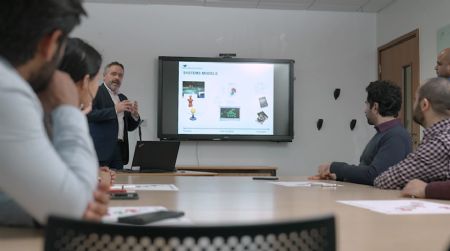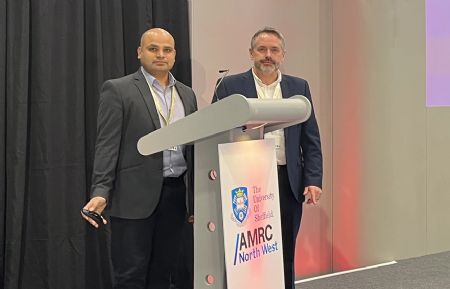 Professor Janet Godsell, InterAct co-director from Loughborough University
Professor Janet Godsell, InterAct co-director from Loughborough UniversityA groundbreaking human-centred approach to change management has played a key role in accelerating digital transformation within
Rolls-Royce’s manufacturing supply chain. The method, developed by
Aston University academics, was part of an innovative study funded by
InterAct, the Made Smarter Innovation programme.
It applied the
Process-Oriented Holonic (PrOH) Modelling Methodology to 100 companies in Rolls-Royce’s digital supply chain system, known as Connected Tempest, which supports the development of the next-generation Tempest aircraft. By integrating soft systems principles and focussing on human factors to address challenges in strategy, culture, technology, and operations, the project helped manufacturing partners enhance their digital maturity. The collaboration provided an opportunity to explore the broader potential of PrOH and create tools, training materials, and a website to further engage the wider industry and academia.
Professor Ben Clegg, Aston University’s professor of operations management, has spent the last decade developing PrOH Modelling as a way of improving the human aspect of change management to enable the manufacturing industry to accelerate its rapid digital transformation and adopt advanced technologies such as artificial intelligence (AI) automation, and the Internet of Things (IoT).
 Pictured right: Ben Clegg in a PrOH modelling workshop
Pictured right: Ben Clegg in a PrOH modelling workshopProfessor Clegg said: “While PrOH has been successfully applied in various manufacturing contexts, including automotive production, aerospace supply chains, and electric vehicle (EV) manufacturing, it was known mainly in academic circles through word of mouth. This research project provided the opportunity to introduce the concept to the broader manufacturing ecosystem, demonstrate its application and value and create a group of champions to spread it across the industry.
“InterAct has given us rocket boosters. We have turned something conceptual into a tangible product, something with a set of tools and training materials which can be delivered to the industry. It is a complete step change towards our ambition to share PrOH with the industry.”
Strategies for digitalisationThe project worked with 100 companies in Rolls-Royce’s supply chain, including suppliers of materials, metals, and machinery, to use the PrOH Modelling Methodology to identify key factors for improving digital maturity. It also involved workshops with industry professionals and academics to develop strategies for digitalisation, culture, process, strategy, data, and training. A workshop at
AMRC Sheffield brought together these groups to further develop and deliver outcomes focused on these key areas.
Professor Clegg said: “The partners in this project have helped to simultaneously catalyse digital adoption in their own operations and extended enterprises to achieve more resilience, sustainability and digital enhancement.”
Looking ahead, the project team — which also included Dr Krishna Balthu, a lecturer in ‘operations management and systems thinking’ at Aston Business School, and Dr Ehsan Eslamian, developer and business intelligence manager at Williams F1 — plans to offer short courses on PrOH Modelling and systems thinking for supply chain improvement, in collaboration with industry bodies such as the Operational Research Society (ORS) and the Institute of Engineering and Technology (IET).
 Pictured left to right: Dr Krishna Balthu and Professor Ben Clegg
Pictured left to right: Dr Krishna Balthu and Professor Ben CleggInterAct was a £4.4 million Made Smarter Innovation-funded, Economic and Social Research Council-led network that brought together economic and social scientists, UK manufacturers, policymakers, and digital technology providers to address the human issues resulting from the diffusion of new technologies in industry.
Professor Janet Godsell, InterAct co-director at Loughborough University, said: “We are proud to have supported this pioneering research, which has demonstrated the transformative power of the PrOH Modelling Methodology in driving digitalisation and operational excellence within the manufacturing sector. The success of this project underscores the critical importance of human-centred approaches to change management and innovation.”
She concluded: “By enabling companies to adopt advanced technologies with a focus on collaboration and consensus-building, we are not only enhancing their digital maturity but also fostering a more resilient, sustainable, and future-ready industry.”